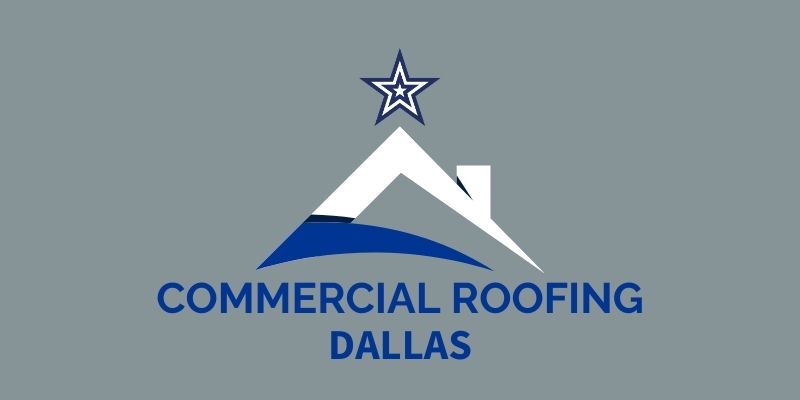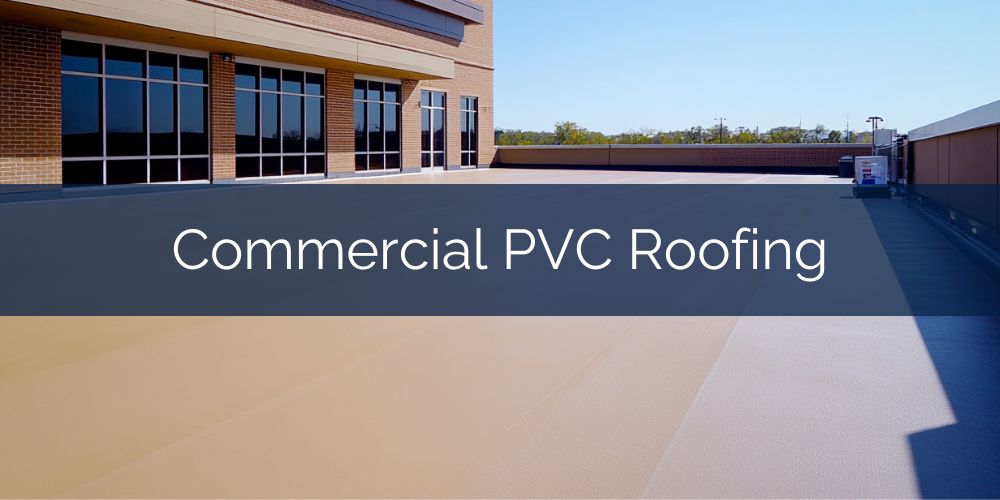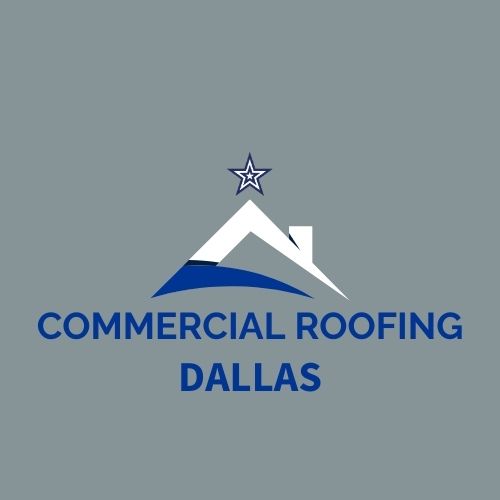Commercial PVC roofing involves the installation, repair, and maintenance of PVC roofing systems on commercial buildings. These systems are commonly used on flat or low-slope roofs, offering durability, flexibility, and strong resistance to chemicals, fire, and environmental elements. PVC roofing materials are lightweight and energy-efficient, reflecting sunlight to reduce heat gain and aid in maintaining interior temperatures. Commercial PVC roofing is ideal for commercial structures such as warehouses, office buildings, and retail centers, where long-term weather resistance and cost-effectiveness are important. Commercial Roofing Dallas provide commercial PVC roofing services across the Dallas, Texas area.
What Is Commercial PVC Roofing?
Commercial PVC roofing, or polyvinyl chloride roofing, is a type of single-ply roofing membrane used extensively in the commercial sector for its durability and energy efficiency. Composed of thick, flexible material, PVC roofing is highly resistant to chemicals, UV radiation, fire, and high wind conditions, making it a popular choice for flat or low-sloped commercial roofs. The reflective surface of PVC membranes helps to reduce cooling costs by reflecting sunlight, thereby reducing the building's overall energy consumption. Installation typically involves heat welding the membrane seams, which ensures a watertight bond that is less prone to leaks. One of the distinguishing features of PVC roofs is their long lifespan, often exceeding 20 years with proper maintenance. Additionally, PVC roofing is available in different colors and thicknesses to accommodate a variety of aesthetic and functional preferences.
In Dallas, Texas, where temperatures can soar in the summer, the reflective nature of commercial PVC roofing aids in keeping buildings cooler and reducing air conditioning expenses. The material's robustness stands up well to the high temperatures, occasional severe weather, and seasonal humidity changes often experienced in Dallas, providing reliable protection for commercial properties throughout the year.
Have a question about an upcoming project?
What Are The Benefits Of Commercial PVC Roofing In Dallas?
Commercial PVC roofing in Dallas offers durability, energy efficiency, and excellent weather resistance. With its reflective surface, it reduces energy costs by deflecting UV rays, contributing to a more sustainable building environment. Additionally, its durability and resistance to chemical damage make it ideal for the varying weather conditions in Dallas.
- Weather Resistance: Ideal for Dallas's hot climate and occasional severe weather conditions.
- Energy Efficiency: Helps to lower cooling costs by reflecting the sun’s rays.
- Durability: Long-lasting material that withstands various environmental stresses.
- Chemical Resistance: Highly resistant to industrial pollutants and chemical exposure.
- Low Maintenance: Requires minimal upkeep, reducing long-term operational costs.
1. Weather Resistance: Ideal for Dallas's hot climate and occasional severe weather conditions
Weather resistance refers to a roofing system's ability to withstand extreme temperatures, UV rays, and severe storms, ensuring durability and longevity in challenging environments. This characteristic is especially crucial for commercial PVC roofing in Dallas, where intense heat and sudden storms are common. A roof with strong weather resistance provides reliable protection, preventing damage and costly repairs, while extending the overall lifespan of the roofing system. A weather-resistant roofing system often incorporates features such as UV inhibitors and impact-resistant materials to withstand harsh conditions. Regular inspections and maintenance are vital to ensure the system remains effective over time. Investing in a high-quality weather-resistant roof not only safeguards the building but also enhances energy efficiency and contributes to long-term cost savings.
2. Energy Efficiency: Helps to lower cooling costs by reflecting the sun’s rays.
Energy efficiency in commercial roofing involves using materials that reflect sunlight, reducing heat absorption and thus lowering cooling energy costs. Reflective roofing systems are especially beneficial in cities like Dallas, where commercial buildings face intense sunlight and high temperatures. By mitigating heat gain, these roofs help businesses achieve significant savings on air conditioning expenses, contributing to more sustainable energy consumption. Using energy-efficient roofing materials such as cool roofs or high-reflectivity membranes enhances the building’s ability to maintain a stable indoor climate with less reliance on cooling systems. This not only extends the lifespan of HVAC systems by reducing wear and tear but also supports environmental initiatives by decreasing energy demand and carbon emissions. In urban settings, this approach can alleviate the urban heat island effect, promoting a healthier microclimate within densely populated areas.
3. Durability: Long-lasting material that withstands various environmental stresses.
Durability refers to the ability of roofing materials to maintain their structural integrity and protective qualities despite exposure to harsh weather conditions and environmental factors. Having durable roofing is vital for commercial buildings, especially in areas like Dallas where roofs are frequently subjected to varying weather conditions, ranging from intense heat to occasional hail. The longevity and resilience of durable roofing materials help reduce the frequency of repairs and replacements, ultimately lowering maintenance costs for commercial property owners. To enhance durability, commercial roofing systems can incorporate materials like TPO or EPDM, which offer excellent resistance to thermal expansion and contraction—a common cause of wear and tear. Regular inspections and proactive maintenance are essential to identify potential vulnerabilities and apply timely reinforcements or coatings. Employing high-quality, durable materials provides long-term protection against leaks, structural damages, and reduces potential downtime for businesses operating in commercial spaces.
4. Chemical Resistance: Highly resistant to industrial pollutants and chemical exposure.
Chemical resistance is the ability of roofing materials to withstand degradation and maintain integrity when exposed to harsh industrial chemicals and pollutants. Chemical resistance in commercial roofing, such as PVC, offers significant benefits in cities like Dallas where industrial emissions and chemical exposure are prevalent. Roofs with high chemical resistance provide long-lasting protection against corrosion and damage, thus enhancing the longevity and reliability of the roofing system. This reliability minimizes maintenance costs and reduces the frequency of roof replacements, offering significant savings over time. Moreover, ensuring strong chemical resistance supports a safer environment for building occupants by preventing chemical infiltration and maintaining a protective barrier. Utilizing roofing materials like PVC that offer superior chemical resistance is crucial for commercial buildings situated in areas with high pollution levels or industrial activities.
5. Low Maintenance: Requires minimal upkeep, reducing long-term operational costs.
Low maintenance refers to roofing systems that demand minimal regular care and repairs, leading to reduced expenses over the life of the roof. Commercial PVC roofing in Dallas is beneficial as its low-maintenance nature minimizes the need for frequent repairs and inspections, ultimately saving money. This is particularly valuable in Dallas, where extreme weather can accelerate wear on traditional roofs. The durability and resistance of PVC roofing against common threats like chemical exposure, fire, and impact result in fewer repairs. Maintaining such a roof involves simple preventative measures like periodic cleaning and inspection, ensuring the property remains protected with minimal effort. These reduced upkeep requirements make PVC roofing a cost-effective option for businesses seeking long-term solutions.
How Does Commercial PVC Roofing Handle Dallas' Weather Conditions?
Commercial PVC roofing excels in Dallas' climate by offering durability, energy efficiency, and weather resistance. Its ability to withstand UV radiation and temperature fluctuations helps in reducing energy costs and extending the roof's lifespan. Additionally, its robust waterproofing qualities ensure it remains effective during heavy rainfalls characteristic of Dallas weather.
- Weather Resistance: Effectively withstands high winds and heavy rain common in Dallas.
- UV Protection: Reflects sunlight, minimizing heat absorption during hot summers.
- Longevity: Strong resistance to punctures and tears extends roof lifespan in varied weather.
- Energy Efficiency: Reduces cooling costs by maintaining low surface temperatures.
- Seam Durability: Heat-welded seams prevent water infiltration during intense storms.
1. Weather Resistance: Effectively withstands high winds and heavy rain common in Dallas.
Weather resistance refers to a roofing material's ability to endure and perform under adverse weather conditions such as strong winds and heavy rainfall. Commercial PVC roofing is specifically designed to handle Dallas' challenging climate by providing superior waterproofing and wind resistance, ensuring that buildings remain protected from potential water damage and structural issues. This quality is critical as Dallas experiences frequent and intense storms, making durability and weather resistance an essential consideration for commercial roofing solutions. A well-constructed PVC roof can minimize the impact of severe weather, preserve the building's structural integrity, and reduce the need for costly repairs. Integrating reinforced membranes within the PVC roofing system further enhances its strength and stability, providing a reliable defense against the harsh weather conditions typical in Dallas. Regular maintenance, including inspection and cleaning, ensures that the PVC roofing system remains in optimal condition to withstand extreme weather events over its lifespan.
2. UV Protection: Reflects sunlight, minimizing heat absorption during hot summers
UV protection refers to the ability of a commercial roofing material to reflect sunlight and reduce heat absorption, thereby protecting the building from excessive heat during hot summers. Dallas' climate, characterized by high temperatures and intense sunlight, necessitates roofing solutions that can efficiently manage heat. Commercial PVC roofing addresses this by providing excellent UV protection, which helps maintain cooler indoor temperatures and reduces energy consumption. Implementing a reflective PVC roofing system can significantly lower cooling costs for businesses, enhancing their energy efficiency and overall operational cost management. Moreover, the reduced heat absorption helps protect the roofing material itself from premature degradation, thereby extending its lifespan. By choosing PVC roofing with UV protection, businesses in Dallas can sustainably manage extreme heat conditions while maintaining a comfortable indoor environment.
3. Longevity: Strong resistance to punctures and tears extends roof lifespan in varied weather.
Longevity refers to the ability of a roofing material to maintain its structural integrity and performance over an extended period, despite exposure to harsh environmental conditions, by resisting punctures and tears. Regarding how commercial PVC roofing handles Dallas' weather conditions, its robust resistance to punctures and tears makes it an ideal choice for enduring the city's variable climate. Dallas often faces severe weather, including storms and intense sun, which can stress a roof, but PVC's durability helps maintain the roof's integrity and function over time. Commercial PVC roofing's enhanced longevity reduces the frequency of repairs and replacements, which in turn minimizes disruption and maintenance costs for business operations. Additionally, by extending the lifespan of the roof, businesses can enjoy a better return on investment while benefiting from continuous, reliable protection against Dallas' diverse weather challenges. This overall resilience against weather extremes emphasizes the long-term value and practicality of PVC roofing systems in commercial applications.
4. Energy Efficiency: Reduces cooling costs by maintaining low surface temperatures.
Energy efficiency is the ability of a commercial roofing system to reduce energy consumption by reflecting rather than absorbing heat, thus lowering cooling costs. Energy efficiency is pivotal when evaluating how commercial PVC roofing can handle Dallas' weather conditions. Dallas' climate frequently involves high temperatures, making it crucial for roofing solutions to reflect heat effectively. By maintaining lower surface temperatures, energy-efficient roofing systems alleviate the demand on cooling systems, offering significant operational cost savings. Integrating energy-efficient roofs in commercial structures can also lessen energy consumption and emissions, aligning with sustainable building practices. Furthermore, by minimizing heat absorption, these roofing systems not only improve indoor comfort but also contribute to reducing the urban heat island effect in large cities like Dallas. Employing energy-efficient roofing systems is a proactive measure toward achieving greener, more sustainable commercial properties.
5. Seam Durability: Heat-welded seams prevent water infiltration during intense storms
Seam durability refers to the ability of roofing seams, especially when heat-welded, to remain impermeable and prevent water infiltration even in severe weather conditions. In Dallas, which experiences intense storms, commercial PVC roofing must withstand significant rainfall and prevent leaks. Heat-welded seams are essential because they create a seamless bond that resists water penetration, protecting the structural integrity of buildings. Regular inspections ensure that the heat-welded seams maintain their integrity, preventing potential water damage. This durability also minimizes the need for frequent repairs, ensuring long-term roof performance and cost savings. For commercial properties, investing in roofing with robust seam durability provides peace of mind during the storm season.
What Common Issues Affect Commercial PVC Roofs In Dallas?
Commercial PVC roofs in Dallas often face issues related to extreme weather conditions and temperature fluctuations. These roofs may experience damage from severe storms, UV radiation, and thermal expansion-contraction cycles, leading to potential leaks and structural weaknesses. Regular maintenance and timely repairs can mitigate these issues and prolong the roof's lifespan.
- Weather Resistance: Vulnerable to damage from Dallas's severe storms and heavy rainfalls.
- UV Radiation: Prolonged exposure leads to material degradation and loss of reflectivity.
- Thermal Expansion: Temperature fluctuations cause expansion and contraction, risking seams and fasteners.
- Ponding Water: Flat surfaces can accumulate water, causing potential leaks and structural compromise.
- Maintenance Neglect: Requires regular inspections to identify and address minor issues before escalation.
1. Weather Resistance: Vulnerable to damage from Dallas's severe storms and heavy rainfalls
Weather resistance refers to a roofing system's ability to withstand environmental conditions such as severe storms and heavy rainfalls without sustaining damage. Dallas's commercial PVC roofs are frequently challenged by severe weather conditions, which can lead to leaks, membrane punctures, and other structural issues with the roofing system. The high frequency of storms and substantial rainfall in Dallas can accelerate wear and tear on roofing materials, reducing the lifespan of commercial buildings' roofs. To improve weather resistance, businesses in Dallas should consider investing in high-durability roofing materials designed for storm-prone areas and ensure regular maintenance checks to spot potential vulnerabilities. Implementing strong roofing systems capable of handling harsh weather events can prevent costly repairs and interruptions to business operations. Additionally, using reinforced membranes or installing additional protective layers can enhance the roof's ability to manage extreme weather conditions.
2. UV Radiation: Prolonged exposure leads to material degradation and loss of reflectivity.
UV radiation causes the breakdown of roofing materials through constant exposure to sunlight, leading to diminished structural integrity and reduced reflectivity of commercial roofs. In Dallas, where commercial PVC roofs are frequently subjected to intense sunlight, UV radiation can lead to accelerated degradation. This results in a loss of reflectivity, causing the roof to absorb more heat and potentially increase cooling costs for commercial buildings. To combat the effects of UV radiation, it is advisable to use UV-resistant treatments or coatings that can extend the life and performance of PVC roofing. Regular inspections ensure that any early signs of UV-induced damage, such as cracks or faded coatings, are addressed promptly. Maintaining the roof's reflective capabilities not only prolongs its lifespan but also enhances energy efficiency in commercial properties.
3. Thermal Expansion: Temperature fluctuations cause expansion and contraction, risking seams and fasteners.
Thermal expansion in commercial roofing refers to the phenomenon where temperature changes cause roofing materials to expand when heated and contract when cooled, potentially stressing seams and fasteners over time. Thermal expansion is a critical concern for commercial PVC roofs in Dallas due to the area's significant temperature fluctuations, which can cause repeated cycles of expansion and contraction. These cycles place stress on the roofing seams and fasteners, increasing the risk of leaks and premature roof failure. Recognizing this, building owners and facility managers must prioritize the choice of flexible materials and regularly inspect these crucial connection points for any signs of stress or movement. Using flexible, high-quality membranes that accommodate temperature-induced movements can reduce the impact of thermal expansion on roofing systems. Regular maintenance practices, such as tightening or replacing fasteners and resealing any compromised seams, can further mitigate the risks associated with thermal expansion. By proactively addressing these issues, the long-term performance and durability of the roof can be significantly enhanced, ultimately protecting the investment and structural integrity of the commercial building.
4. Ponding Water: Flat surfaces can accumulate water, causing potential leaks and structural compromise.
Ponding water refers to water that collects and remains on a flat roof because of poor drainage or structural issues, increasing the risk of leaks and weakening the roof's structural integrity over time. Ponding water is particularly problematic for commercial PVC roofs in Dallas due to the tendency for flat surfaces to gather water during heavy rainfalls, which are common in the region. Persistent ponding can exacerbate the potential for leaks, especially when combined with Dallas's fluctuating temperatures, leading to possible material degradation and structural concerns. Regular inspection and maintenance of drainage systems can help mitigate ponding issues and extend the roof's lifespan by ensuring water is effectively removed from flat roofing surfaces. Implementing improved drainage solutions such as tapered insulation or additional drains can help minimize water accumulation. Proactive measures are necessary to prevent potential structural damage and costly repairs resulting from prolonged water exposure and subsequent compromised roof performance.
5. Maintenance Neglect: Requires regular inspections to identify and address minor issues before escalation.
Maintenance neglect relates to the failure to perform regular inspections and upkeep, leading to minor roofing issues compounding into major problems that could affect the entire commercial roof system. Neglecting maintenance is particularly problematic for commercial PVC roofs in Dallas where the climate can subject roofs to extreme conditions, exacerbating minor issues if not regularly addressed. With Dallas's frequent temperature fluctuations and sporadic weather events, small problems like sealant cracks or pooled water can quickly escalate if inspections are not conducted routinely. Regular inspections serve to catch these minor issues, enabling timely repairs that prevent costly, extensive damage. For commercial roofs, integrating a scheduled maintenance plan can dramatically prolong the roof's life, helping avoid premature failures and expensive interventions. Proactive maintenance strategies can also improve the overall energy efficiency and structural integrity of the building.


